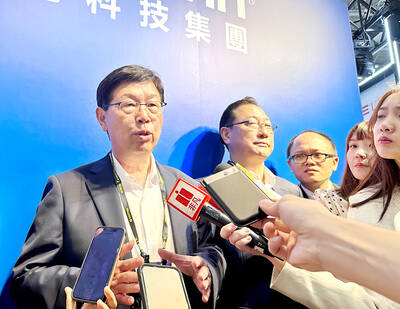The TAIEX yesterday climbed out of a slump to close higher, led by shares of contract chipmaker Taiwan Semiconductor Manufacturing Co (TSMC, 台積電), which recovered from a tumble in the previous session, dealers said.
TSMC helped boost the bellwether electronics sector, and the gains also spread to the old economy and financial sectors, lending additional support to the main board, but turnover remained low amid fears of further volatility on US markets, dealers said.
The TAIEX closed up 0.78 percent at 16,144.85 on turnover of NT$197.899 billion (US$6.67 billion).
The TAIEX opened up 0.26 percent, ignoring the losses on US markets overnight, and it gained momentum as TSMC shares attracted bargain hunters after plunging 2.97 percent on Thursday, dealers said.
BARGAIN HUNTING
The bargain hunting also spread to non-technology stocks, including the steel and financial sectors, helping the TAIEX close above 16,100 points after its 1.70 percent tumble the previous day, they said.
“While US markets continued to trend lower, the selling was more on the Dow than the tech-heavy NASDAQ index,” Mega International Investment Services Corp (兆豐國際投顧) analyst Alex Huang (黃國偉) said. “Investors here simply took advantage of the heavy losses suffered by electronics stocks yesterday to pick up bargains today.”
The Dow Jones Industrial Average fell 0.75 percent on Thursday, while the NASDAQ finished 0.26 percent lower.
“In Taiwan, TSMC became the major target among bargain hunters, as its share price was relatively low, while its fundamentals remained sound,” Huang said.
TSMC shares rose 1.53 percent yesterday to close at NT$530, contributing almost 70 points to the TAIEX’s gain, and leading the electronics and semiconductor subindices to rise 0.72 percent and 1.09 percent respectively.
Other semiconductor heavyweights finished mixed, with chipmaker United Microelectronics Corp (聯電) shares losing 0.20 percent to close at NT$50.70, while shares of application-specific IC designer Faraday Technology Corp (智原科技) dropped 1.25 percent to close at NT$950.
In the wider electronics sector, shares of iPhone assembler Hon Hai Precision Industry Co (鴻海精密) fell 0.47 percent to close at NT$107, while those of PC brand Acer Inc (宏碁) shed 1.42 percent to close at NT$27.75 after Acer chairman Jason Chen (陳俊聖) said that he was afraid PC demand would be affected by COVID-19 lockdowns in China and inflation worldwide.
Formosa Plastics Corp (台灣塑膠) shares gained 1.46 percent to close at NT$104.50.
Shares of Evergreen Marine Corp (長榮海運), the nation’s largest container cargo shipper, lost 0.74 percent to close at NT$135, while those of its rival Yang Ming Marine Transport Corp (陽明海運) finished 2.17 percent higher at NT$117.50.
In the financial sector, which rose 0.86 percent, Fubon Financial Holding Co (富邦金控) shares closed up 0.32 percent at NT$61.80, while Cathay Financial Holding Co (國泰金控) shares closed 0.38 percent higher at NT$52.90.

Taiwan Transport and Storage Corp (TTS, 台灣通運倉儲) yesterday unveiled its first electric tractor unit — manufactured by Volvo Trucks — in a ceremony in Taipei, and said the unit would soon be used to transport cement produced by Taiwan Cement Corp (TCC, 台灣水泥). Both TTS and TCC belong to TCC International Holdings Ltd (台泥國際集團). With the electric tractor unit, the Taipei-based cement firm would become the first in Taiwan to use electric vehicles to transport construction materials. TTS chairman Koo Kung-yi (辜公怡), Volvo Trucks vice president of sales and marketing Johan Selven, TCC president Roman Cheng (程耀輝) and Taikoo Motors Group

Among the rows of vibrators, rubber torsos and leather harnesses at a Chinese sex toys exhibition in Shanghai this weekend, the beginnings of an artificial intelligence (AI)-driven shift in the industry quietly pulsed. China manufactures about 70 percent of the world’s sex toys, most of it the “hardware” on display at the fair — whether that be technicolor tentacled dildos or hyper-realistic personalized silicone dolls. Yet smart toys have been rising in popularity for some time. Many major European and US brands already offer tech-enhanced products that can enable long-distance love, monitor well-being and even bring people one step closer to

RECORD-BREAKING: TSMC’s net profit last quarter beat market expectations by expanding 8.9% and it was the best first-quarter profit in the chipmaker’s history Taiwan Semiconductor Manufacturing Co (TSMC, 台積電), which counts Nvidia Corp as a key customer, yesterday said that artificial intelligence (AI) server chip revenue is set to more than double this year from last year amid rising demand. The chipmaker expects the growth momentum to continue in the next five years with an annual compound growth rate of 50 percent, TSMC chief executive officer C.C. Wei (魏哲家) told investors yesterday. By 2028, AI chips’ contribution to revenue would climb to about 20 percent from a percentage in the low teens, Wei said. “Almost all the AI innovators are working with TSMC to address the

FUTURE PLANS: Although the electric vehicle market is getting more competitive, Hon Hai would stick to its goal of seizing a 5 percent share globally, Young Liu said Hon Hai Precision Industry Co (鴻海精密), a major iPhone assembler and supplier of artificial intelligence (AI) servers powered by Nvidia Corp’s chips, yesterday said it has introduced a rotating chief executive structure as part of the company’s efforts to cultivate future leaders and to enhance corporate governance. The 50-year-old contract electronics maker reported sizable revenue of NT$6.16 trillion (US$189.67 billion) last year. Hon Hai, also known as Foxconn Technology Group (富士康科技集團), has been under the control of one man almost since its inception. A rotating CEO system is a rarity among Taiwanese businesses. Hon Hai has given leaders of the company’s six